Henry Cowles Biblical Studies and Commentary Collection (16 vols.)
Digital Logos Edition
Overview
Henry Cowles strove to make the original words of Scripture understandable to today’s church. Cowles aimed for sound interpretation, bringing out the truest sense of the passage, while illuminating its historical context, its audience, and the intent of its author. In this way, Cowles’ works affirmed that the Bible is a practical book, useful for Christians of every time and place.
Each volume begins with a lengthy introduction that provides contextual information. Much of the commentary on the text is verse-by-verse, with the exception of the Pentateuch and historical books, which are treated topically in chronological order. Although Cowles makes full use of his expertise in the original languages by explaining the literary and linguistic background as necessary, this commentary series is accessible for English-only Bible study. It is beneficial for both pastors and scholars, as well as laypersons.
Many of the volumes also contain appended essays on theological topics relevant to themes in the book, including an essay on atonement in the volume on Hebrews, an essay on prophecy and eschatology appended to Revelation, an essay on theodicy appended to the volume on the Pastoral Epistles, and several others.

- Commentary on the entire Bible
- Numerous appended essays discussing theological themes
- Influential commentary on Daniel and Revelation that helped shaped nineteenth century prophetic interpretation
The work is a treasure to the Christian Church and the world; among the very best contributions to the interpretation of the Word of God, enriched, but not overloaded or obscured, by learning . . . I most cordially commend to all intelligent Christian men and women the careful perusal of these learned, instructive, and deeply spiritual commentaries. The possession of them would be a priceless treasure . . .
—John Morgan, Oberlin College
They embody the results of much research, and elucidate the text of sacred Scripture with admirable force and simplicity.
—Christian Intelligencer
There is, within my knowledge, no other work on the same portions of the Bible, combining so much of the results of accurate scholarship with so much common sense and so much of a practical and devotional spirit.
—Leonard Bacon, Yale College
The exposition given is brief, clear, pertinent, and very satisfactory . . . It is just such a book as the majority of intelligent students of the Bible require.
—Princeton Review
Dr. Cowles writes with perspicuity, precision, and conciseness—three invaluable excellences of style for a commentary.
—Bibliotheca Sacra
- Title: Henry Cowles Commentary Series (16 vols.)
- Author: Henry Cowles
- Publisher: D. Appleton and Company
- Volumes: 16
- Pages: 6,597
This title is included in the following collections
You can save when you purchase this product as part of a collection.
2025 Collector's Edition Libra...
$10,999.99$8,249.99Logos 8 Collector's Edition Le...
$11,399.99$11,399.99Logos 7 Collector's Edition Le...
$11,399.99$11,399.99Logos 6 Collector's Edition Le...
$11,399.99$11,399.99
- $11,399.99
- $23,999.99$17,999.99
- $21,749.99
- $24,999.99
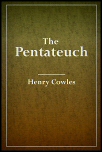
The Pentateuch, in its Progressive Revelations of God to Men
- Author: Henry Cowles
- Publisher: D. Appleton and Company
- Publication Date: 1874
- Pages: 414
The books of Genesis, Exodus, Leviticus, Numbers, and Deuteronomy reveal a great deal of the knowledge of God we seek—God’s creation, providence, and his revealed Word. The Pentateuch contains Cowles’ topical commentary on the first five books of the Bible. He provides ample discussion of the great themes of the Pentateuch, discussing the Pentateuch both practically and critically—addressing the higher critical assessments of the Pentateuch which began to emerge during Cowles’ life and ministry.
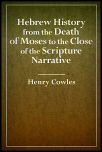
History from the Death of Moses to the Close of the Scripture Narrative
- Author: Henry Cowles
- Publisher: D. Appleton and Company
- Publication Date: 1880
- Pages: 419
"All history is useful,” writes Cowles, “in so far as it makes truthful revelations of man’s doings and of God’s agencies in and above them.” That makes the study of Old Testament history especially essential for understanding God’s relationship with humanity—both thousands of years ago and in the church today.
In this volume, Cowles presents the entire history of the Israelite nation from the death of Moses to the close of the Old Testament. He traces the hand of God in Israel’s history, explaining difficult passages and discussing the lives of significant figures in Israel’s history. He also describes the relationship between the historical books of the Old Testament and the Psalms, poetical books, and prophecy—and proposes how all can be read together.
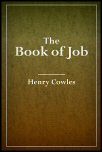
The Book of Job: with Notes, Critical, Explanatory, and Practical
- Author: Henry Cowles
- Publisher: D. Appleton and Company
- Publication Date: 1877
- Pages: 298
The book of Job takes a prominent place in the study of the Old Testament. It is one of the oldest books in the Bible. It reveals a great deal about the surrounding peoples and cultures. It contains stirring poetry which speaks to a wide range of human experiences and emotions.
In The Book of Job, Cowles asks important questions about Job’s history, language, and moral implications, and describes the lessons contemporary readers can learn from Job. He also sheds light on how great thinkers in Christian history have wrestled with Job. Most important, Cowles’ commentary places the meaning of Job within the grasp of ordinary readers. Although he discusses exegetical matters, he writes primarily for a lay audience.
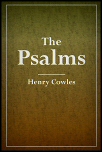
The Psalms; with Notes, Critical, Explanatory, and Practical
- Author: Henry Cowles
- Publisher: D. Appleton and Company
- Publication Date: 1879
- Pages: 554
Any interpretation of Scripture must assume that it was written to be understood by its first readers—and this is especially true of the Psalms, which were prepared for public worship, sung and spoken by the masses, and accessible to ordinary people. For today’s readers of the Psalms, this book is understandable insofar as we are able to place ourselves in the position of the authors and of the people who first heard, sung, and spoke its poetry. That makes thoughtful commentary on the Psalms vital for today’s church.
Cowles’ commentary on the Psalms explains the language and poetic purpose, as well as the special history of many of the individual Psalms. He discusses exegetical matters, such as authorship, dating, and original use. Although his commentary is designed for English readers, he also describes many of the poetic nuances of the original language.
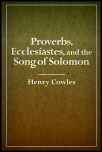
Proverbs, Ecclesiastes, and the Song of Solomon, with Notes, Critical, Explanatory, and Practical
- Author: Henry Cowles
- Publisher: D. Appleton and Company
- Publication Date: 1884
- Pages: 363
The writings of Solomon contain a beauty and worth that is not regularly appreciated. Its instructions for obtaining wisdom and living a virtuous are essential for anyone choosing a life of discipleship. This commentary on Proverbs, Ecclesiastes, and the Song of Solomon discusses the ongoing importance of the Wisdom literature, and helps modern readers understand its necessity for today.
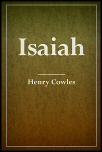
Isaiah, with Notes, Critical, Explanatory, and Practical
- Author: Henry Cowles
- Publisher: D. Appleton and Company
- Publication Date: 1869
- Pages: 552
Isaiah is among the most well known and widely read prophets. According to Cowles, Isaiah “saw the future Messiah more clearly and spoke of him more clearly . . . than any other prophet.” That makes Isaiah essential for understanding God’s plans for his people—to save them, to send a Messiah, and to provide comfort, redemption, and hope.
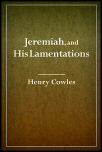
Jeremiah, and His Lamentations, with Notes, Critical, Explanatory, and Practical
- Author: Henry Cowles
- Publisher: D. Appleton and Company
- Publication Date: 1871
- Pages: 431
Jeremiah is an important book of history and prophecy which describes the downfall of Israel into exile. Yet it also contains God’s promises of hope and restoration. The bold words of Jeremiah reveal a God who does not tolerate sin, but loves his people enough to speak to them in their departure toward exile. Cowles’ commentary on the books of Jeremiah and Lamentations corrects misconceptions about these books, discusses difficulties in the texts, and illustrates God’s providence throughout history.
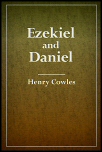
Ezekiel and Daniel, with Notes, Critical, Explanatory, and Practical
- Author: Henry Cowles
- Publisher: D. Appleton and Company
- Publication Date: 1870
- Pages: 472
This volume complements Cowles’ commentary on the minor prophets. His commentary on Ezekiel examines the imagery, poetics, and other difficult features of the book. He describes the visions, prophecy, history, and poetry in terms which help make sense of Ezekiel for ordinary readers.
In his commentary on Daniel, Cowles applies the best principles of interpretation to arrive at the clearest possible understanding of Daniel. Cowles acknowledges that commentators throughout history have reached wildly divergent views of Daniel—especially the apocalyptic literature. Yet he also shows that a rigorous and careful examination of the book can yield clarity and show God’s movement in history. In addition to Cowles’ thorough commentary, this volume also contains a discussion and rebuttal of the Millerite theology prevalent during Cowles’ time, traces of which still exist today.
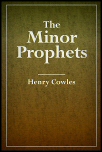
The Minor Prophets, with Notes, Critical, Explanatory, and Practical
- Author: Henry Cowles
- Publisher: D. Appleton and Company
- Publication Date: 1868
- Pages: 424
Prophets held a special role in the Mosaic system. As Israel strayed from God, and Israel’s religion lost its power in the world, prophets conveyed messages, calling upon the people to listen and repent. In many ways, the writings from the prophets—God’s own words—must be taken as seriously now as when they were first spoken. Yet no portion of Scripture, says Cowles, is “so little studied, so little read, and so little understood” as the prophets, and especially the minor prophets. That makes this commentary essential for today’s readers seeking to understand the powerful words of God conveyed through the prophets.
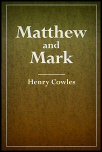
Matthew and Mark, with Notes, Critical, Explanatory, and Practical
- Author: Henry Cowles
- Publisher: D. Appleton and Company
- Publication Date: 1887
- Pages: 391
This commentary on Matthew and Mark examines Jesus’ birth, life, death, and resurrection, and significance of these events on both the history of the world and the daily life of Christian believers. Each Gospel exposes important and unique facets of Jesus’ ministry. From miracles to prophecy, Cowles describes the events in terms understandable by ordinary readers.
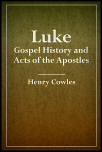
Luke: Gospel History and Acts of the Apostles, with Notes, Critical, Explanatory, and Practical
- Author: Henry Cowles
- Publisher: D. Appleton and Company
- Publication Date: 1881
- Pages: 493
This volume combines Cowles’ commentary on Luke and Acts, providing a continuous history of the rise and early development of Christianity from the ministry of Jesus to the spread of the Gospel to the ends of the earth. In addition to studying each book on its own, Cowles also identifies the relationship between the books. In particular, he ties together the life of Jesus with the ministry of the spirit.
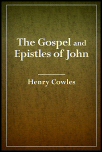
The Gospel and Epistles of John: with Notes, Critical, Explanatory, and Practical
- Author: Henry Cowles
- Publisher: D. Appleton and Company
- Publication Date: 1876
- Pages: 393
John’s Gospel, says Cowles, was written for two purposes: “that you might believe that Jesus is the Christ, the Son of God, and that, believing, you might have life through his name.” Cowles admits that his commentary, like the Gospel of John, can have no other purpose than this. John reveals Jesus to the world. To know Jesus as John reveals him is not only to know that he is sent from the Father, bears witness to truth, suffers as the Lamb of God, and rises from the dead—it is also to know his heart of love, sympathy, fellowship, and friendship. In this way, John’s writings bring Jesus impressively near. In addition to commentary on John’s Gospel, Cowles also provides commentary on the Epistles of John.
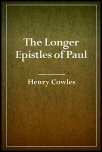
The Longer Epistles of Paul: viz., Romans, I Corinthians, II Corinthians
- Author: Henry Cowles
- Publisher: D. Appleton and Company
- Publication Date: 1880
- Pages: 395
This volume contains commentaries on Paul’s longer epistles—to the Romans, and the two epistles to the Corinthians. In these books, Paul outlines prominent features of theology, as well as answers to questions of ethics, morality, and practical Christian living. For each book, Cowles provides a lengthy introduction to the historical context, as well as detailed commentary on the key themes and purposes of the entire text.
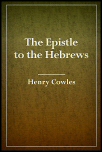
The Epistle to the Hebrews, with Notes, Critical, Explanatory and Practical
- Author: Henry Cowles
- Publisher: D. Appleton and Company
- Publication Date: 1878
- Pages: 244
The paramount interest in Hebrews lies in its revelations of the character and redemptive work of Jesus Christ. Hebrews presents Jesus as the mediating High Priest and the atoning sacrifice for our sin. It also displays a firm awareness of the Old Testament laws and covenants, and connects Jesus to the long tradition of God’s revelation and provision for Israel. Perhaps more than any other book, Hebrews connects the Old Testament to the New. In fact, Cowles writes that “no Christian themes can possibly surpass these in profound interest and importance.”
In addition to detailed commentary on Hebrews, this volume also contains five essays which deal with theological themes related to Hebrews:
- The Relation of the Divine to the Human in the Person of Christ
- Apostasy and Saints’ Perseverance
- The Premillennial Advent of Christ
- The Atonement
- The Christian “Higher Life”
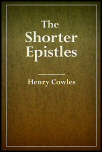
The Shorter Epistles; viz., of Paul to the Galatians; Ephesians; Philippians; Colossians; Thessalonians; Timothy; Titus and Philemon; also of James, Peter, and Jude
- Author: Henry Cowles
- Publisher: D. Appleton and Company
- Publication Date: 1879
- Pages: 500
Cowles’ commentary on Paul’s shorter epistles places each epistle in the light of its individual history, bringing as much as possible of the life and the writer and the context of his audience to the fore. These letters were written for a purpose, says Cowles, and they should be read in light of that purpose. It is in these epistles to the earliest churches where we look for the practical Christianity of the apostles—how it was built upon Christ, and how the spirit sustained it. In addition to Cowles’ commentary, this volume also contains his essay on Frederic William Farrar’s Eternal Hope.
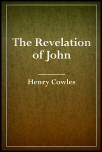
The Revelation of John, with Notes, Critical, Explanatory, and Practical
- Author: Henry Cowles
- Publisher: D. Appleton and Company
- Publication Date: 1871
- Pages: 254
Revelation is one of the most complicated books of the Bible, and has spawned wild interpretations. In his commentary on the book, Cowles shows that Revelation was written to a people undergoing persecution. Its writer was in exile, Christians were being martyred, and the people to whom he wrote lived in intense fear. Revelation offered its readers—then and now—apocalyptic and prophetic visions of comfort, hope, and Christ’s glorious return. In addition to contextual issues, Cowles also discusses the symbols in Revelation, seeking to understand the events of the present in light of God’s promises and prophecies. This volume concludes with an appendix on the possibilities of prophetic interpretation.
Henry Cowles was born in Connecticut. He graduated from Yale in 1826 and from the seminary at Yale in 1828, where he was honored as the salutatorian of his class. He later received his DD from Hillsdale College.
Upon graduation from Yale, Cowles became a professor at Oberlin College. He served as professor of languages from 1835 to 1837, professor of ecclesiastical history and pastoral theology from 1837 to 1840, professor of Old Testament literature from 1840 to 1848, and a lecturer on prophecy and biblical introduction from 1869 to 1878. Cowles was influential at Oberlin during its early years, and joined a circle of notable Oberlin professors which included John Morgan, Charles Finney, and John Cowles. He also served as editor of the Oberlin Evangelist from 1844 to 1862, where he promoted the efforts of the college and helped spread its theological ideals. While at Oberlin, Cowles advocated for African Americans during the decades preceding the Civil War, and promoted racial equality not only in academic settings, but also in his publications.
In 1863, at the age of 60, Cowles began writing his commentary on the Bible, and worked on the project nearly every day for 17 years. He also spoke and wrote widely on prophecy, biblical interpretation, and the practical application of the Bible for ordinary readers. He died in 1881.
Reviews
10 ratings
AeliusCicero
6/19/2014

Tyrone K Toler
5/24/2014
Rodger
12/12/2013

Rev. Thomas S. McEwen B.Th; M.Div.
11/28/2013
Kenneth Goh
11/6/2013

Larry Proffitt (I
11/2/2013

Faithlife User
10/30/2013

Into Grace
10/26/2013
Timothy C. Seal
7/15/2013
Spurgeon wrote regarding Cowles, "In his own way this author is one of the most instructive of American writers; he is clear and definite, and leaves his meaning impressed upon the mind. His scholarship is respectable."